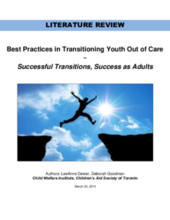The transition from youth to adulthood is a crucial period in the life of any young person. It can be a particularly difficult time for youth who are transitioning out of the care of the child welfare system. Youth who have been in care may face certain challenges in the transition out of care and into adulthood, such as: dropping out of school, failing to find employment, early parenthood, experiencing conflict with the law and/or homelessness and having minimal familial support. It is essential, therefore, to have an understanding of these difficulties in order to help youth transition out of care and into adulthood.
This literature review examines literature on the best practices for youth aging out of care that indicate successful outcomes for them as adults. The paper identifies factors that may present barriers to youth leaving care and transitioning to adulthood, including lack of supportive relationships, educational challenges, housing instability, and economic challenges (employment).
The paper also identifies existing evidence-based practices and successful programs that assist youth in transitioning successfully. Some of the most effective existing programs that help to improve outcomes for youth ‘aging out’ are those that offer vocational and education training supports (including employment readiness and career planning), ‘readiness planning for adulthood’, financial management training, housing aid, financial assistance, employment services, and the opportunity for youth to develop strong relationships with families who are committed to them.

